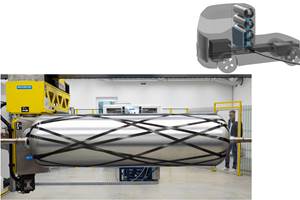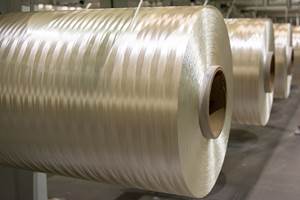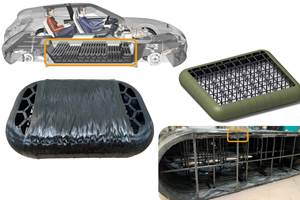Six candidates nominated for "Biocomposite of the Year 2019"
Natural fiber composites and wood plastic composites compete for 7th annual innovation award.
Share

Today, up to 80% of plastics can be replaced by bio-based fillers such as wood flour and cork or reinforced by natural fibers. These biocomposites are available for almost every application — including packaging, consumer goods, building façades and interior components, and automotive parts — as demonstrated by this year’s nominated companies.
The winners of the innovation award “Biocomposite of the Year 2019” will be chosen at the 8th Biocomposites Conference Cologne (Nov 14-15, Cologne, Germany), where exciting new biocomposite technologies and applications will be discussed via a broad range of topics. The day before and parallel to the conference, EU project-related workshops will feature international biocomposites experts presenting and discussing case studies, market figures and strategies for a circular wood value chain.
Out of 15 applications for this year’s biocomposites innovation award, six new materials and products have been nominated for the innovation award by the conference advisory board. Each finalist will give a 10-minute presentation at the conference, after which, three winners will be elected by the conference participants. Each of the six finalists below offers significant potential to help address global issues with waste, CO2 emissions and the future of our planet’s irreplaceable natural resources.

Car door using PowerRibs. SOURCE | Bcomp
PowerRibs – sustainable lightweighting
Bcomp (Fribourg, Switzerland) has developed proprietary light-weighting solutions for high performance applications by combing the latest composites knowledge with natural fibers. PowerRibs uses a reinforcing grid. inspired by the thin veins in leaves, to provide maximum stiffness at minimum weight. This enables natural fibers to achieve the performance of carbon fibers in a motorsport body, for example, resulting in a 75% lower CO2 footprint, 30% lower cost and improved safety without toxic dust and shattering upon impact. PowerRibs are also used to make automotive interior panels up to 40% lighter, and offer more sustainable options for end-of-life structures.
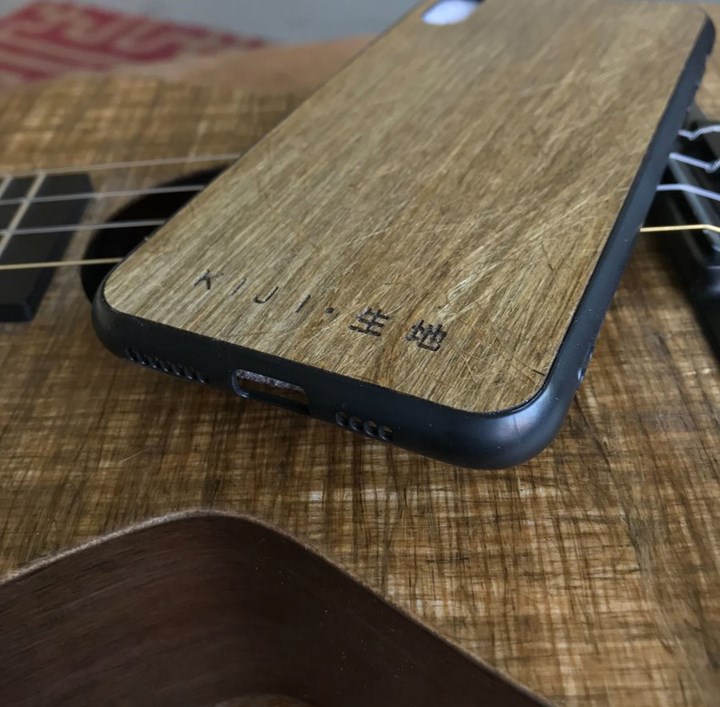
SOURCE | Lingrove
Ekoa veneers – sustainable composites to replace wood
Lingrove (San Francisco, Calif., U.S.) produces high-performance biobased composites, including the Ekoa and Ekoa TP product lines using flax fibers and biobased thermoset and thermoplastic resins, respectively. Lingrove’s biodegradable Ekoa veneers offer a higher stiffness/weight ratio vs. steel, lighter weight vs. carbon fiber and have the look and performance of old-growth wood. For example, Blackbird guitars made with Ekoa look like wood, but resist effects from humidity and sunlight better than wood, while preventing deforestation of non-replaceable old-growth/rain forests. In sporting goods, Ekoa provides a unique aesthetic and dampens vibration. Lingrove is currently scaling veneer and panel production to meet demand from automotive, furniture and interiors applications.
OrganoComp and molding of large, 3D biocomposites
OrganoClick (Täby, Sweden) launched its OrganoComp biocomposite in May 2019. A patented, 100% biobased material made from Swedish wood fiber and a biopolymer binder produced from food and pulp industry byproducts such as orange peels and shrimp shells. OrganoComp is produced with a patented production technology for molding large, 3D-shaped biocomposite components and is replacing hard plastics, MDF-boards and particle boards that contain synthetic glues used in applications like interiors, furniture, acoustic panels, waste containers and burial coffins. The strength of OrganoComp enables 50% raw material reduction of a coffin, for example, while maintaining a traditional appearance.
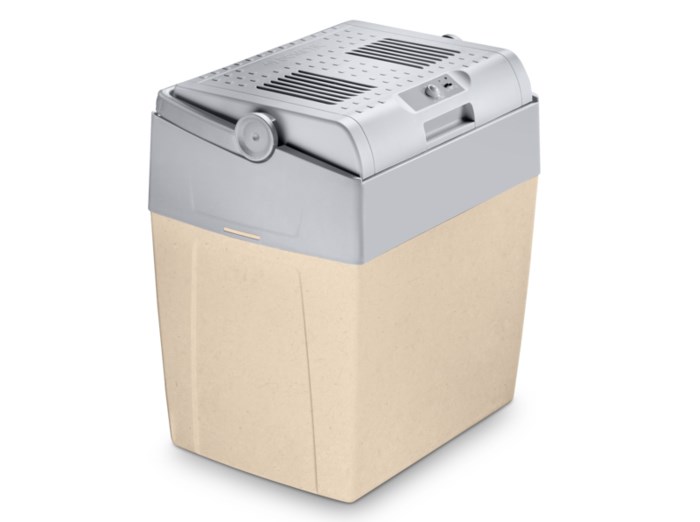
SOURCE | Dometic and Trifilon
Market-tested biocomposites made with hemp fibers
Trifilon (Nyköping, Sweden) offers a green alternative to plastics with its BioLite material: polypropylene with up to 30% hemp fiber reinforcement. Hemp is one of the strongest natural fibers in the world, making BioLite products strong, light and durable. BioLite is supplied as granulates for injection molding. Trifilon also produces BioForm for compression molding. Applications include vehicle components, luggage, coolers, consumer goods, packaging and containers. BioLite achieves a 26% lower carbon footprint compared to conventional polypropylene in PhantomBIO luggage and Dometic’s Coolfun SC30B cooler housing .
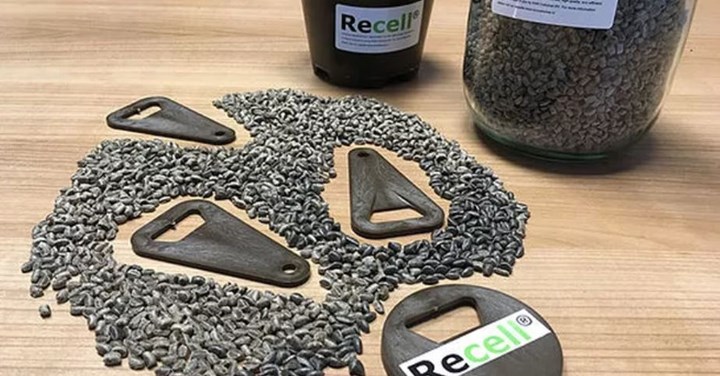
Source | KNN Cellulose
Recell biocomposite – the cost-competitive alternative
Recell Group (Leeuwarden, Netherlands) has commercialized Recell biocomposite, a granulate biocomposite made using cellulose from recovered toilet paper and biopolymers such as PLA or PHA. The resulting product is fully biobased, compostable and competitively priced with low environmental impact. The granulate is suitable for standard injection molding and extrusion processes. Current applications include fencing, decking, crates and building cladding. Featured in this year’s competition is a picnic table produced by EcoDeck using Recell cellulose fibres efficiently produced from Sewage Treatment Plants (STPs) with Cellvation technology. This benefits STPs with lower operational costs and increased processing capacity while the fibers are reused instead of being incinerated.
Home compostable coffee capsules
Golden Compound (Ladbergen, Germany) has introduced HOMEcap, the world’s first and only home-compostable coffee machine capsule, which uses fleece made from ground sunflower seed fibers as a reinforcing material. This material, dubbed “Golden Compound green”, has unique characteristics: the oxygen barrier is very much comparable with conventional plastics, is aroma-proof and avoids exterior packaging. Home composting such commonly used (and discarded) items as coffee capsules significantly reduces waste streams. A VDI 4605 sustainability assessment showed that HOMEcap outperforms current state-of-the-art capsules, such as those made with multi layers of deep-drawn PP EVOH, in terms of sustainability.
Related Content
Cryo-compressed hydrogen, the best solution for storage and refueling stations?
Cryomotive’s CRYOGAS solution claims the highest storage density, lowest refueling cost and widest operating range without H2 losses while using one-fifth the carbon fiber required in compressed gas tanks.
Read MoreWelding is not bonding
Discussion of the issues in our understanding of thermoplastic composite welded structures and certification of the latest materials and welding technologies for future airframes.
Read MoreBio-based acrylonitrile for carbon fiber manufacture
The quest for a sustainable source of acrylonitrile for carbon fiber manufacture has made the leap from the lab to the market.
Read MoreTU Munich develops cuboidal conformable tanks using carbon fiber composites for increased hydrogen storage
Flat tank enabling standard platform for BEV and FCEV uses thermoplastic and thermoset composites, overwrapped skeleton design in pursuit of 25% more H2 storage.
Read MoreRead Next
All-recycled, needle-punched nonwoven CFRP slashes carbon footprint of Formula 2 seat
Dallara and Tenowo collaborate to produce a race-ready Formula 2 seat using recycled carbon fiber, reducing CO2 emissions by 97.5% compared to virgin materials.
Read MoreVIDEO: High-volume processing for fiberglass components
Cannon Ergos, a company specializing in high-ton presses and equipment for composites fabrication and plastics processing, displayed automotive and industrial components at CAMX 2024.
Read More“Structured air” TPS safeguards composite structures
Powered by an 85% air/15% pure polyimide aerogel, Blueshift’s novel material system protects structures during transient thermal events from -200°C to beyond 2400°C for rockets, battery boxes and more.
Read More



